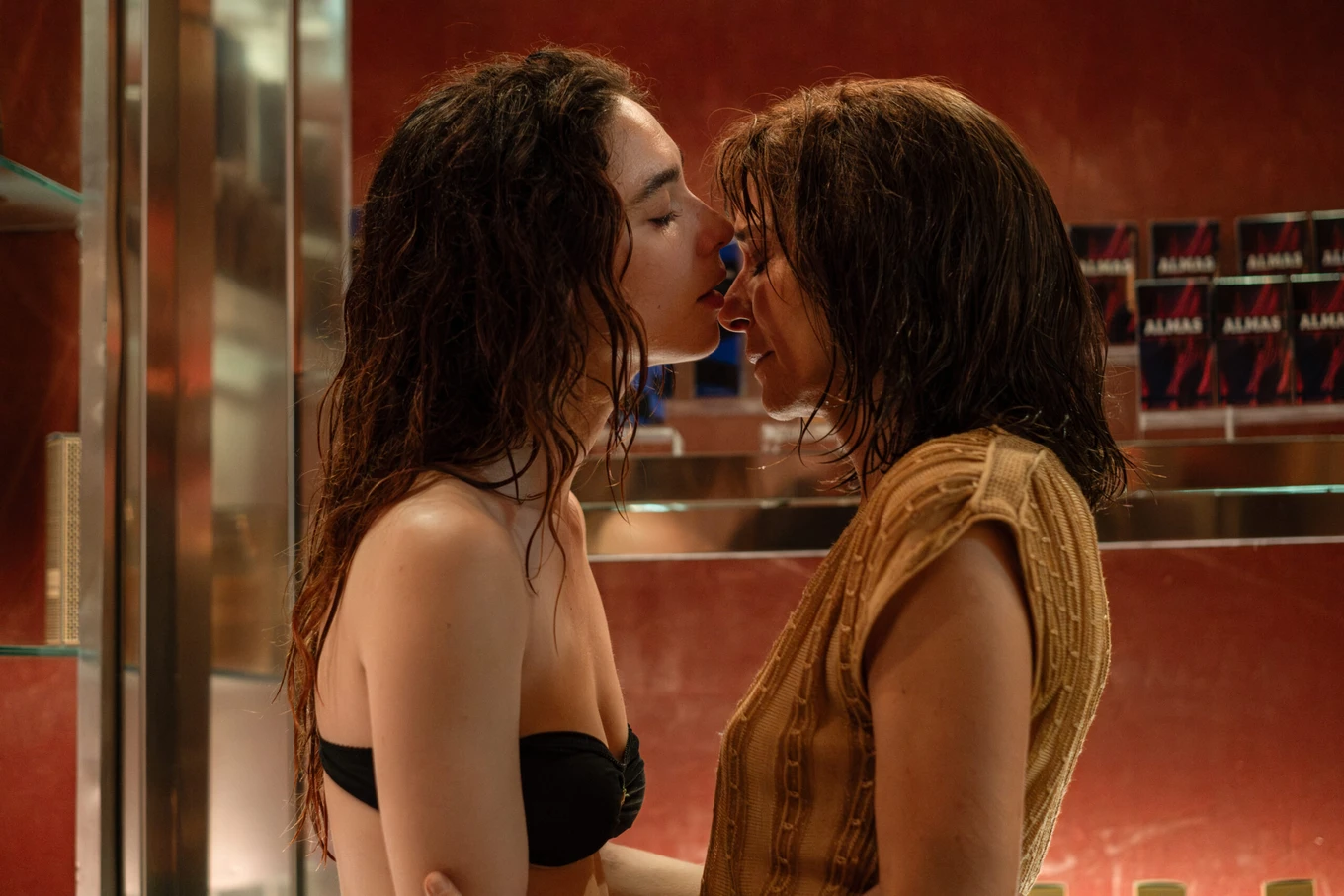One of Italy’s heavyweight cultural productions of 2025 (and the only Italian film competing in Cannes), Mario Martone’s Fuori (literally, Outside) breaks out of standard biopic prescriptions with broad impressionistic strokes that mimic the intriguing modernity of its subject Goliarda Sapienza, the multifaceted author of The Art of Joy (L’arte della gioia). Considered an epic masterpiece, it was refused publication in Italy during her lifetime and her subsequent fame was posthumous. Her curious name aptly reflects the unconventional, bisexual life she lived, far outside the norms of her time (1924-1996) and place, and her bold, clear-sighted search for cultural and personal freedom, laced with grave depression, still pushes the boundaries today.
The film’s exceptional all-female cast, which features Valeria Golino and Matilda De Angelis in memorable career performances, offer viewers a way to visualize Goliarda’s abstract contention that civil society limits personal freedom in subtle and dangerous ways. Both individual and collective freedom is under discussion here, as the writer contrasts her stint in prison to the claustrophobic limits she feels outside on the city streets. Conventional morality and female roles are continually challenged in a film without much action, but with a narrative tension that holds the attention for nearly two hours.
Co-writing with Martone is his regular scriptwriter Ippolita Di Majo, who worked on two of the director’s other biopics, The King of Laughter based on the life of comic theater legend Eduardo Scarpetta and the 19th century poet Leopardi. Here the subject is almost contemporary, yet less familiar and more sprawlingly difficult to recount, considering that Goliarda Sapienza shaped Italian culture on many different levels. They included her involvement with movie-making in the 1950’s as an actress and as an influential on-set assistant for directors like Bertolucci, Pasolini and Visconti. Born in Sicily, the daughter of a trade union organizer who knew Gramsci and Lenin (her mother) and one of the drafters of the Constitution of Italy (her father), the future writer grew up in an anti-fascist, anti-clerical household where left-wing political activism was the norm.
Rather regrettably, none of this fascinating backstory finds its way into the film, though one can see what the screenwriters were up against. Instead, we are plunged into Sapienza’s life mid-stream when she is 55 and has lost much of her courage and impetus to write. It is one of the darkest periods of her life, and the story begins as she is released from prison after stealing a woman friend’s jewelry and hocking it – partly, she says, to fund the release of her first novel; and partly as a “provocation”, just to see what would happen.
Set during the hot Roman summer of 1980 and oozing a lazy, explorative atmosphere, the story is told through a series of encounters the writer has with women she has met in prison who like her are now out of jail, interlaced with casual flashbacks to prison life. In reality, her stay inside the Roman prison of Rebibbia was brief, but it seems much longer in the film, corresponding to the immense effect it had on her outlook. She saw life in prison was a microcosm of social inequality and injustice, an extreme form of reclusion that mirrored the more subtle restrictions on freedom “outside”.
Her most intimate friend – and presumably lover – in that period is Roberta, a law-breaking criminal who is also a political prisoner, and some 30 years her junior. Rising star Matilda De Angelis (Rose Island, Across the River and into the Trees) has a punchy modern beauty and a sassy, street-smart attitude to match. Though the age difference makes her feel at a disadvantage and jealous, Goliarda shows she is no slouch in keeping up with Roberta as she slugs down double shots of straight gin on a hot summer day. Golino, who gets embarrassingly plastered, becomes jealous when Roberta’s tacky boyfriend arrives, and we join in her disapproval.
In a long sequence in an after-hours perfume shop, which Barbara (played by the singer Elodie, pitch perfect), another ex-prisoner, has just opened, the writer feels excluded from Roberta and Barbara’s edgy banter and secludes herself in a fancy bathroom complete with a tempting shower. The two younger women find her sitting there naked, smoking a cigarette while she waits for her body to dry. They end up stripping off too, but the scene is shot with such modesty (why?) that it’s not clear what happens. It’s one place there was no need to put the brakes on Goliarda’s rule-flouting hedonism. (Other places include two bedroom scenes that seem uselessly ambiguous.)
Photographed by D.P. Paolo Carnera with a stylized naturalism, mid-August Rome in 1980 is revealed as a breathtaking city devoid of cars (since every Roman took the family vehicle on vacation the same week). An empty Piazza del Popolo and ritzy Parioli are truly iconic images, as are the stylized views of the Termini train station and its glass restaurant, courtesy of production designer Carmine Guarino’s keen eye for location.
Noteworthy aids to the actresses’ very physical acting are the costume choices by designer Loredana Buscemi: Goliarda in flowing silk dresses with patterns recalling the bohemian 20’s; Roberta in punky leather jackets easy to remove.
Director: Mario Martone
Screenwriters: Mario Martone, Ippolita Di Majo
Producers: Nicola Giuliano, Francesca Cima, Carlotta Calori, Viola Prestieri, Annamaria Morelli
Co-producers: Toufik Ayadi, Christophe Barral, Jean Labadie, Alice Labadie
Cast: Valeria Golino, Matilda De Angelis, Elodie, Corrado Fortuna, Antonio Gerardi, Carolina Rosi, Francesco Gherghi
Cinematography: Paolo Carnera
Production design: Carmine Guarino
Costume design: Loredana Buscemi
Editing: Jacopo Quadri
Music: Valerio Viglliar
Sound: Maricetta Lombardo
Production companies: Indigo Film in association with Rai Cinema, The Apartment, Fremantle
World sales: Goodfellas
Venue: Cannes Film Festival (Competition)
In Italian
115 minutes





